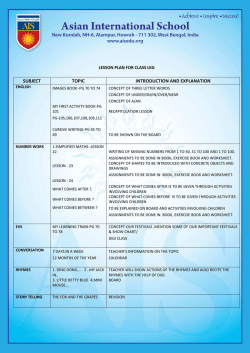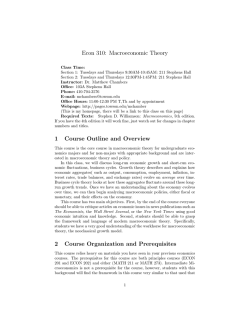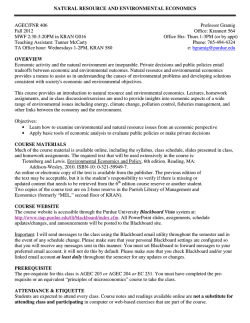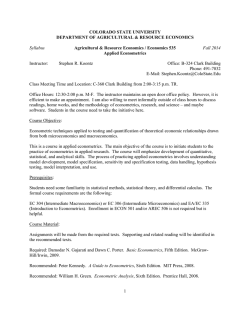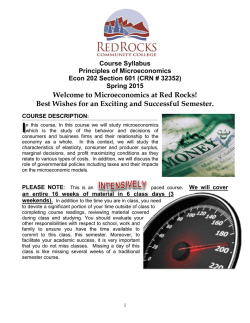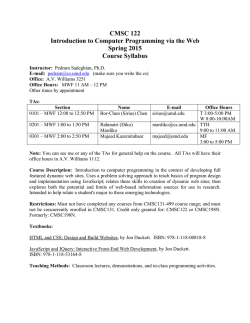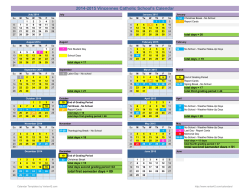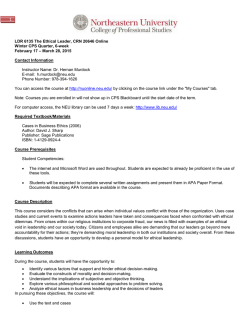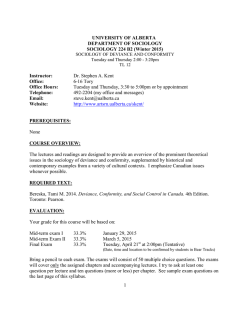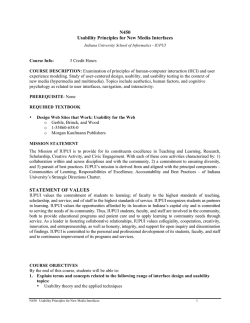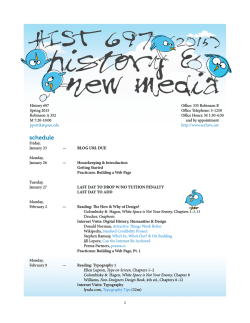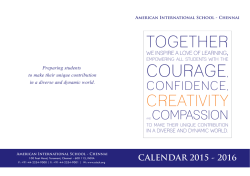
ME172 Control Systems Design - California State University
ME172 Course Syllabus Spring Semester 2015 CALIFORNIA STATE UNIVERSITY SACRAMENTO The Department of Mechanical Engineering ME172 – CONTROL SYSTEM DESIGN SYLLABUS DESIGNATION: Mechanical Design and Mechatronic Systems CATALOG DESCRIPTION: ME172 CONTROL SYSTEM DESIGN Use of mathematical models for the generation of equations of motion for mechanical and electrical systems. Evaluation of single and multiple degrees of freedom systems in the time and frequency domain. Topics include feedback control systems, Laplace transform, state space representation, transfer functions, error analysis, stability of control systems and system response. Automatic control system design using root locus and frequency response methods. Design of compensating controls using state of the art software and automation tools. Introduction to digital control. INSTRUCTOR: Prof. José J. Granda Riverside 5002, 916- 278-5711 Email: [email protected] OFFICE HOURS: 2:00 – 3:00 p.m. T, TH or by appointment TIME: 9:00 – 10:15 a.m. Tu-th PLACE: Arc 1014, TECHNOLOGY USED: Exchanges of materials will all be electronic. Notes, assignments, etc. WEB PAGE. - Course documents will be posted on the instructor’s web site or on the University Web Sites. OBJECTIVES: The objective of this course is to provide the student with analytical and computer skills that will allow students to: 1. Use the terminology in controls and derive the differential and algebraic equations for mathematical representation of physical and control systems 2. Know how to calculate and predict the behavior of dynamic systems using computer models and simulation with MATLAB and SIMULINK. 1 ME172 Course Syllabus Spring Semester 2015 3. Use of state space, transfer functions forms for control systems design 4. Demonstrate effective problem-solving skills to design control systems using modern software tools. DESIGN PROJECT: A final design project using the computer is required for passing the course. PREREQUISITE: E110, ME171 TEXT: - REFERENCES: CONTROL SYSTEMS ENGINEERING 7th Edition. New Jersey. John Wiley & Sons Inc., 2014. Print. CAMPG/MATLAB-SIMULINK User’s manual J. Granda Modern Control Systems by Richard Dorf, Robert Bishop Pearson, Prentice Hall, 2008 LEARNING PROCESS: You are the only one solely responsible for your learning success, not your Professor, not the Department and not the University. You will have plenty of materials to consult, to go over, examples on the class web site in form of presentations and videos. It is your responsibility to look over these materials. Some will continue to be developed as we go along. The student will be expected to study the assigned reading assignments and homework following the schedule. Students are responsible for ALL material presented in class. This includes any announcements, due dates, changes or clarifications made in class. The instructor and the materials available to you will be your guidance, but the real learning process takes place on your own going over examples in class and in communication with the instructor. The student should not rely only on class notes but rather your are expected to study independently the assigned reading assignments and homework following the schedule. ASSIGNMENTS: Reading and homework assignments will be assigned every week. It is expected that the problems will be completed and turned in on time. No late homework will be accepted since after the due date, the solutions will be in the reserve section of the Main Library. There will be no make up tests except in cases of confirmed illness. KNOWLEDGE, SKILLS, AND ABILITIES STUDENTS SHOULD HAVE BEFORE ENTERING THIS COURSE: Communicate technical information accurately and concisely – both orally and in writing, use analysis, computer software, word processors, etc., to define and develop solutions to technical problems. The skills learned in E110, ME171 are helpful to set the right 2 ME172 Course Syllabus Spring Semester 2015 KNOWLEDGE, SKILLS, AND ABILITIES STUDENTS GAIN FROM THIS COURSE: The objective of this course is to provide the student with analytical and computer skills that will allow students to analyze and design control systems. Present students the opportunity to acquire an ability to design control systems in a variety of job applications. IMPACT ON SUBSEQUENT COURSES IN CURRICULUM: For those enrolled students, who have not yet participated in the capstone design course, provides a foundation for analysis and computer tools to be used in their senior projects of ME190, ME191. It will also facilitate the understanding of modeling, simulation and control of multi-body systems. ABET CRITERIA 2000 OUTCOMES ACHIEVED: This course contributes to the following EC2000 Criterion 3 outcomes and those specific to the EAC accredited _ program. Outcome a. An ability to apply knowledge of mathematics, science, and engineering b. An ability to design and conduct experiments, as well as to analyze and interpret data c. An ability to design a system, component, or process to meet desired needs d. An ability to function on multi-disciplinary teams e. An ability to identify, formulate, and solve engineering problems f. An understanding of professional and ethical responsibility Outcome g. An ability to communicate effectively h. The broad education necessary to understand the impact of engineering solutions in a global/societal context i. A recognition of the need for and an ability to engage in life-long learning j. A knowledge of contemporary issues k. An ability to use the techniques, skills, and modern engineering tools necessary for engineering practice l. Begin list of any other outcomes unique to the program. ABET PROGRAM CRITERIA OUTCOMES ACHIEVED: Program criteria outcomes are unique to each degree program and are to be compiled from the program criteria given for each degree program and listed in bullet format below. a. Demonstrate a knowledge of the science, mathematics, and engineering principles that are fundamental to thermal and mechanical systems design and manufacturing; b. Identify, analyze, and solve technical problems in the areas of machine design, including solid mechanics and control systems; fluid mechanics, thermodynamics, and heat transfer, materials properties and selection; and manufacturing, using the principles of multivariate calculus and differential equations, including the appropriate use of computer technology; d. Apply creativity in design of systems, components, or processes to meet desired needs. e. Function effectively as part of a team f. Communicate effectively through speaking, writing and graphics, including appropriate use computer technology. 3 ME172 Course Syllabus Spring Semester 2015 g. Show understanding of professional, ethical, and social responsibilities and the need for a commitment to life-long learning and participation in professional societies. COMPUTER USAGE: Computers are used for writing reports (WORD) and presentations (PowerPoint). Spreadsheets are used as appropriate in doing multiple trade studies. Computational tools such as MATLAB, SIMULINK, MATLAB , CAMPG and NASTRAN4D are used as these are the current state of the art tools. . CLASS FORMAT: This course follows a lecture format. Assignments will be both individual and group. Groups will be approximately 4 people, and pre-assigned by the instructor. Students are responsible for reading the assigned material prior to the scheduled class. Class participation is required and part of the course grading. Students are encouraged to actively participate and to ask questions freely. Students will be expected to present their work periodically. COURSE GRADING: Quizzes ............………………….. Homework ……………………………. Computer Assignments. Individual Project ......…………………. Final Exam ...........………………….. 40% 10% 30% 10% 10% 100% EXAMS/QUIZZES: Exams and assignments will be graded balancing the procedure used and the correctness of your answer on an equal basis. Presentation and organization of your assignments will also be considered in grading. There will be Quizzes approximately one to two weeks apart, including the last week of class. Quizzes and final exam will be closed book exams. If there is a discrepancy in grading, you have two weeks from the date you received it to bring up for discussion. After that period grades are final. Projects are due on the last day of class. Work turned in after the deadlines will not be computed in your final grade. If there is a discrepancy in grading, you have two weeks from the date you received it to have it reviewed. Do not expect a change simply because it is reviewed but rather on the merit of your work. After that period all grades are final. Homework, computer assignments will have deadlines and Final Projects are due on the last day of class. Work turned in after that will not be computed in your final grade. An incomplete will not be assigned unless an agreement with student has been outlined for course completion prior to the date grades are due. Students are responsible for ALL material presented in class. This includes any announcements, changes or clarifications made in class as well as the due dates. HOMEWORK, COMPUTER ASSIGNMENTS POLICY: 4 ME172 Course Syllabus Spring Semester 2015 Assignments are issued each week and students work is due in one week unless otherwise noted in the accompanying class schedule. Assignments are due at the start of class on the due date. Late assignments may be accepted, but at a loss of 20% of the grade per 24 hours late. Homework assignments will be returned to students post grading. There will be reading homework and computer assignments. Students are responsible for ALL material presented in class. This includes any announcements, changes, clarifications on assignments, or due dates. It is expected that the assignments will be completed and turned in before or on the specified deadlines. There will be no make up tests except in cases of confirmed and documented illness or emergency. As the semester goes on and you realize "things" are not going well for you in this class or you become frustrated with the computer, be aware of the policy on drops and incomplete. To drop the class you must meet deadlines and an incomplete is rarely granted and can not be used to "bail out" of the class. EXAMINATIONS: There will be quizzes and exams. These will be announced to cover specific topics of the course. The final exam will be administered in accordance with the University scheduled time. Make-up exams require the permission of the instructor prior to the day of the exam. ATTENDANCE: Regular attendance is expected. SCHEDULE / CRITICAL DATES: Last Day of Official Adds/Drops Holidays Last Drop Day for Possible Refund Mid-Term Exam Spring Break Last Drop Day (with Approval) Final Book Reports Due Final Exam Other important dates are available from the University Academic Calendar web site. SPECIAL NOTES: Students with Disabilities: The California State University provides upon request appropriate academic adjustments for qualified students with disabilities. For more information, contact the Office of the Dean of Students or the College of Engineering Director of Students with Disabilities. Class Web Sites and Student Privacy: Web-based, password-protected class sites are associated with all academic courses taught at The University. Syllabi, handouts, assignments and other resources are types of information that may be available within these sites. Site activities could include exchanging e-mail, engaging in class discussions and chats, and exchanging files. In 5 ME172 Course Syllabus Spring Semester 2015 addition, electronic class rosters will be a component of the sites. Students who do not want their names included in these electronic class rosters must restrict their directory information in the Office of the Registrar. EVALUATION: The Measurement and Evaluation Center forms for the College of Engineering will be used during the last week of class to evaluate the course and the instructor. UNIVERSITY POLICY ON INDIVIDUAL WORK CSUS is a high level educational institution and therefore a professional environment should exist. However discipline problems or attempts to disrupt any aspect of the course, or influence other students to do the same. The assignments are supposed to be individual unless assigned as a group. Copying assignments or exams will at the very least, result in zeroes assigned to ALL involved. It is the Mechanical Engineering Department's policy to remove from the major students who copy an exam or to expel them from the university. Copying or deleting unauthorized disk files will have the same effect. Logging onto somebody else's account is not permitted. Students are expected to answer questions on any of the work they hand-in. Students are encouraged to make constructive suggestions to the instructor about any aspect of the course. Please feel welcome to come and see me. Students are encouraged also to suggest projects, particular engineering problems or research topics of interest to the whole class. INSTRUCTOR RESERVES THE RIGHT TO REVISE SCHEDULE AS NECESSARY COURSE CONTENTS 6 ME172 Course Syllabus Spring Semester 2015 ME172 COURSE CONTENTS WEEK TOPICS LAB ASSIGNMENTS ______________________________________________________________________________ 1 Basic concepts of writing equations of physical systems, spring, mass, damping elements. Block diagrams. 2 Mathematical Models of Systems in the frequency Domain. Laplace transform, transfer functions. Mechanical and Electrical systems. 3 Review of State Space Representation of physical systems. Review of transfer functions. Laplace transform. Free and forced response. 4 Computational methods using MATLAB, SIMULINK. Automated Transfer functions (CAMPG) or other plant generating software (SIMWISE 4D). 5 Automated State Space representation of systems. Time Response. Poles, zeros. First and Second order systems. 6 SOLIWORKS + SIMWISE 4D Software for Control Design. 7 Stability of Linear Feedback systems. Routh-Hurwitz criterion 8 Steady State error, systems type. 9 Control Design via Frequency Response. Bode Plots. PI , PD ,PID, lead/lag Compensation 10 Root Locus Techniques. Start your final project. 11 Control Design via Root Locus PI , PD ,PID, lead/lag Compensation 12 The Design of Feedback Control Systems. Gain Margin, Phase Margin, Stability 13 Continuation from previous week 14 Design Projects 15 Design Projects Presentations 16 Final Exams 7
© Copyright 2026
